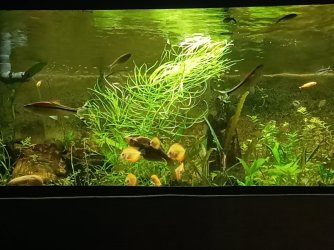Hi,
I bought a School of Melon Discus fish from a Breeder for my Planted Fish Tank Yesterday. The Reason what Inspired me was a friend who shared the same Passion but doesn't have the Time to keep them. Usually I put my hand in the tank to replant all the floating stems however, now I can't put my hand cause the Discus get stressed. Sometimes they school sometimes some are missing hiding. I had to even switch off the LED light till they get used to the Environment.
Can anyone give me some Insights on keeping New Arrival Discus and what changes to a planted tank setup needs to be done.
I bought a School of Melon Discus fish from a Breeder for my Planted Fish Tank Yesterday. The Reason what Inspired me was a friend who shared the same Passion but doesn't have the Time to keep them. Usually I put my hand in the tank to replant all the floating stems however, now I can't put my hand cause the Discus get stressed. Sometimes they school sometimes some are missing hiding. I had to even switch off the LED light till they get used to the Environment.
Can anyone give me some Insights on keeping New Arrival Discus and what changes to a planted tank setup needs to be done.



